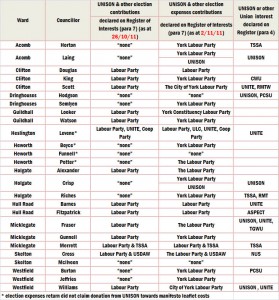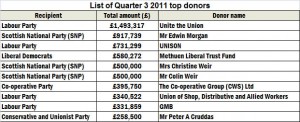Upon taking office, each Councillor must record any Interests that they may have on a publicly available Register. The Register can be viewed “on line” at the Councils web site.
The list is intended to make clear what Interests individual Councillors may have and which might influence their voting behaviour. While it is mainly aimed at reassuring electors that Councillors do not bring influence to bear on issues from which they might personally benefit, it also provided transparency on any links with Companies, Trades Unions and other outside bodies.
Generally the system has worked well and until recently there seemed to be no reason to suppose that all Councillors had not been diligent in filling in and maintaining the accuracy of the register.
As reported on this site previously, concerns were raised about Labour Councillors not declaring an interest at the June Council meeting when a proposal to increase the number of Trades Union officials paid for by taxpayers was considered. The vote came only a few days after candidates at the local elections had confirmed, in returns lodged at the Guildhall, the amounts paid towards their election expenses by third parties.
Most were expected to declare contributions at least from the political party that had nominated them.
By the 26th October, 12 members of the Labour group had failed to register any donations towards their election expenses.
The guidance on completing the register is clear: “The Standards Board for England does not draw a distinction between direct financial assistance (payments of money directly to a Councillor for election or other expenses) and indirect assistance (such as payment for election posters or leaflets). You should register any person or organisation who has made a financial contribution (whether direct or indirect) to your election campaign or who assists you with the costs of carrying out your duties. This may include your political party”.
A complaint about this irregularity was registered with the local Standards committee.
A few days later several Councillors updated their Register entries with 2 now admitting a donation towards their election expenses having been made by UNISON (Cllrs Laing and Crisp).
3 Councillors (Hodgson, Funnell and McIlveen) continued to claim that they had received no help towards the costs of the election (although their running mates in the wards concerned had by then admitted at least a contribution from the Labour Party).
The Standards Committee must now decide whether the Register of interests is now accurate and what action to take – if any – on the votes which were recorded at Council meetings without the appropriate Declaration if Interest being in place.



